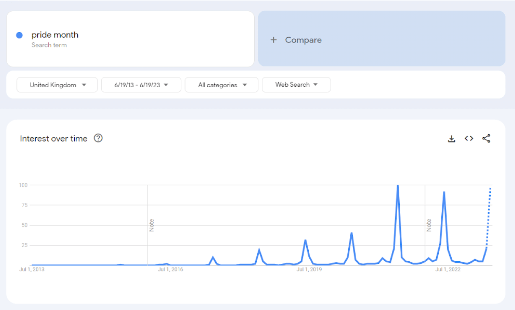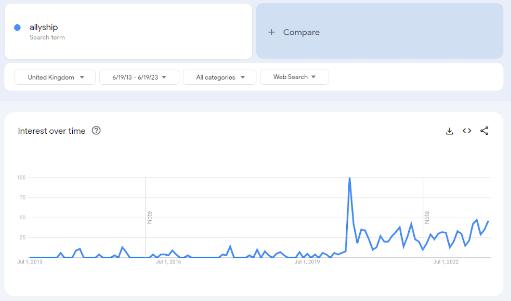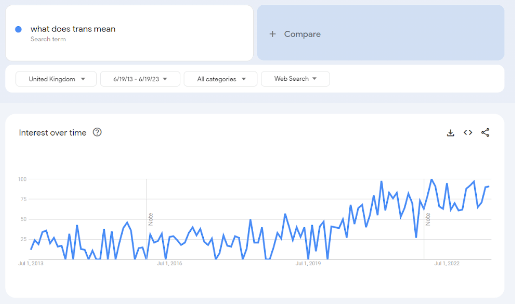Beyond the Rainbow: What Search Trends Tell us About Pride
As the world continues evolving, so does how we seek and consume information. Search engines have become our go-to exploration, knowledge, and discovery tools.
In an era where inclusivity and acceptance are gaining momentum, it comes as no surprise that searches related to Pride have become increasingly prevalent.
Beyond the vibrant parades and rainbow flags, a vast realm of curiosity and inquiries hide within search engine enquiries.
Let’s delve into the world of Pride through the lens of online searches, uncovering the questions and interests that reflect a society’s growing understanding of LGBTQIA+ matters.
What is Pride Month?
Pride Month, observed annually in June, is a global celebration commemorating the LGBTQIA+ community and its ongoing struggle for equal rights and recognition. The month is a platform to promote acceptance, diversity, and the fundamental principle that love is love, regardless of sexual orientation or gender identity.
Originating from the Stonewall Riots in 1969, Pride Month has transformed into a vibrant and inclusive movement, marked by colourful parades, events, and rallies worldwide. Beyond the festivities, Pride Month holds a deeper significance, fostering a sense of belonging, unity, and empowerment for LGBTQIA+ individuals and their allies.
Pride Month serves as a time to honour the achievements, remember the challenges faced, and advocate for a future where everyone can live authentically, free from discrimination.
How Pride has progressed
Since its creation, Pride Month has witnessed remarkable progress regarding LGBTQIA+ visibility, rights, and societal acceptance. It has become a global movement transcending borders, cultures, and generations.
Pride has achieved significant milestones over the years, including the decriminalisation of homosexuality, the recognition of same-sex marriage, and the implementation of anti-discrimination laws in many countries.
These victories, fuelled by the tireless efforts of LGBTQIA+ activists and allies, have propelled the movement forward, challenging societal norms and fostering inclusivity.
Pride Month has become a platform for education, awareness, and advocacy, where individuals and organisations actively work to dismantle prejudice and promote equality.
While challenges and obstacles persist, the progress made during Pride Month reflects a collective determination to create a future where everyone is celebrated, accepted, and afforded equal rights.
Why search behaviour matters for Pride
In today’s digital age, search engines serve as gateways to information and knowledge. By examining search behaviours surrounding Pride, we gain insights into the questions, attitudes, and interests of individuals seeking to expand their understanding of LGBTQIA+ issues.
Searches provide a glimpse into the collective consciousness, revealing evolving attitudes, misconceptions, and areas where education is needed. Additionally, search data guides organisations and activists in tailoring their messages, resources, and support networks to meet the specific needs of the LGBTQIA+ community.
By analysing search behaviours, we can identify gaps in knowledge, tackle stereotypes, and promote accurate information, ultimately fostering a more inclusive society where LGBTQIA+ individuals are embraced and understood.
Recognising the significance of search behaviours for Pride allows us to harness the power of information and technology to drive positive change and empower individuals to become informed allies.
However, while search behaviours surrounding Pride provide valuable insights, they also unveil an unfortunate reality — the negativity and prejudice still existing in society. Examining search queries can uncover discriminatory beliefs, harmful stereotypes, and offensive language that persist despite progress made in LGBTQIA+ rights.
These negative search intents serve as a reminder that Pride Month is still needed to combat ignorance, promote empathy, and challenge the deeply ingrained biases that perpetuate discrimination.
By addressing these negative search behaviours head-on, we can confront and dismantle the misconceptions and biases that hinder true acceptance and equality.
An analysis of search trends surrounding Pride Month
By examining the patterns and queries surrounding the LGBTQIA+ community, we have gained insights into the changing landscape of LGBTQIA+ awareness and acceptance.
From the most searched Pride-related terms to the top questions about the community, we will delve into highlighting the positive aspects of growing LGBTQIA+ awareness and uncover the challenges that persist.
Interest in Pride Month has grown
Interest in Pride Month has undeniably experienced a remarkable surge, as evident by the growing search volumes and online engagement surrounding this annual celebration.
In the past four years, the keyword “pride month” has increased monthly search volume (MSV) by 1,209.98%.

Google Trends graph showing the peaks of interest in the term “pride month” (2013-2023)
With easy access to information, individuals from all walks of life are increasingly curious to learn more about Pride and its significance.
This heightened interest not only reflects a shift in societal attitudes towards the LGBTQIA+ community but also serves as a testament to the power of digital platforms in fostering awareness and driving social change.
As more people engage with Pride-related searches, it paves the way for increased visibility, acceptance, and support, ultimately creating a more inclusive and affirming environment for LGBTQIA+ individuals worldwide.
However, the increase in search terms related to Pride Month does not solely indicate positive curiosity and acceptance. It also reflects the pressing need to address the ongoing challenges faced by the community. The rise in searches for topics such as LGBTQIA+ hate crimes, discrimination, and violence reveals the harsh realities that persist in many societies.
For example, the keyword “lgbt hate crimes” peaked in June 2022, and the term “anti-lgbt” has slowly increased since 2013, with patterns peaking each year around Pride Month.
These troubling search patterns underscore the urgent necessity to combat prejudice, promote understanding, and advocate for the safety and rights of LGBTQIA+ individuals.
While the increased interest in such issues is an opportunity for awareness and mobilisation, it serves as a sobering reminder of the work that remains to be done in creating a world where every person can live without fear of discrimination or harm based on their sexual orientation or gender identity.
Allyship is increasingly important
Since June 2020, during Pride Month and beyond, there has been a noticeable increase in search popularity surrounding the concept of allyship. The term “allyship” has increased monthly search volume by 878.37% in the past four years.

Google Trends graph showing growing interest in the search term “allyship” (2013-2023)
This search surge demonstrates a growing recognition of the importance of being an ally, learning about LGBTQIA+ experiences, and actively working to dismantle systemic barriers. It signifies a willingness among individuals to listen, educate themselves, and take action in support of LGBTQIA+ rights and equality.
By embracing allyship, people are actively working towards creating safer and more accepting spaces for LGBTQIA+ individuals, fostering a sense of unity and belonging.
Homophobic slurs
Regrettably, an analysis of search trends reveals a distressing truth. Out of 13 direct (direct meaning terms that can’t be interpreted for anything else) homophobic slang terms, five have increased. These slurs specifically target specific segments of the LGBTQIA+ community, for example, one derogatory term used against the Lesbian community has increased 529.05% in the past four years.
This rise in derogatory search terms is deeply concerning and highlights the persistence of prejudice and discrimination. Such hateful language perpetuates harmful stereotypes and undermines efforts towards inclusivity and acceptance. While witnessing the surge in these searches is disheartening, it is essential to confront this issue head-on.
By acknowledging and raising awareness about the prevalence of homophobic slurs, we can work collectively to educate, challenge societal biases, and promote respect and dignity for all individuals.
Interest in the trans community and transphobia
Search trends reveal a trend of individuals seeking education and understanding about the trans community.
Queries such as “what does trans mean” (59.3% increase in the past four years) and “what does non-binary mean” (781.62% increase in the past four years) exemplify the curiosity and openness of people to learn about gender identities beyond the binary.
This growing interest in seeking knowledge reflects a positive shift in societal attitudes and a willingness to embrace diversity.

Google Trends graph showing an increased interest in the search term “what does trans mean” (2013-2023)
Regrettably, search queries also expose the pervasive presence of transphobia within society. Data reveals an alarming increase of over 80% in transphobic slurs in search queries over the past four years.
TransLeeds, a local charity supporting the Trans and non-binary community, told SALT:We typically get more people messaging us/attending support groups in the new year, the beginning of the academic year and after the Pride parade in August. Events such as Trans Day of Visibility and Trans Day of Remembrance also see an increase.
Attendance at our support groups has been much higher since the new year. We’re not sure whether this is because more people are becoming aware of TransLeeds or if the increasingly transphobic atmosphere in the media is causing more people to seek support.
Generally, though, we find that the majority of people, organisations and companies are supportive and that the haters are a vocal but small minority.
TransLeeds currently consists of three people, working unpaid in their spare time. Here are just some of the services they offer:
- Four support groups a month
- Run regular social activities such as board gaming, karaoke, and picnics
- Offer a free binder library
- Moderate five online support chats/groups
- Advocate at GP and Gender Clinic appointments with service users
- Sit on committees with other bodies such as Leeds City Council and West Yorkshire Police
- Run stalls at universities and colleges and offer trans awareness training to companies and organisations
You can donate to TransLeeds here.
Reflection on our findings
Our research has uncovered both positive advancements and ongoing challenges within the realm of Pride Month and its associated search behaviours.
On one hand, we celebrate the growing interest in Pride Month, the increase in searches related to LGBTQIA+ education, allyship, and diverse gender identities. These trends signify progress, showcasing a society that is becoming more inclusive, accepting, and eager to learn.
However, we must also confront the negative aspects revealed in our research: the presence of homophobic slurs, transphobic queries, and persistent discrimination.
These findings emphasise that while Pride Month has achieved significant milestones, its importance and relevance remain undeniable.
It serves as a reminder that despite the progress made, there is still work to be done to combat prejudice, educate, and advocate for the rights of the LGBTQIA+ community.
How time has impacted LGBTQIA+ search trends
Over time, the evolution of search terms surrounding LGBTQIA+ topics has been notable. As societal attitudes have progressed, search terms have shifted to reflect the changing landscape.
The emergence of new terms like “non-binary” and “genderqueer” reflects the expanding understanding and visibility of diverse gender identities.
This evolution demonstrates the impact of time in shaping search behaviour, highlighting a society that is becoming more informed, inclusive, and open-minded.
The importance of conscious marketing in Pride Month
Conscious marketing during Pride Month is of utmost importance, particularly in addressing the phenomenon of rainbow washing and ensuring that companies “practice what they preach.”
With the increasing commercialisation of Pride, it becomes crucial for businesses to go beyond surface-level gestures and demonstrate genuine support for the LGBTQIA+ community.
Rainbow washing, where companies slap rainbow symbols on their products without actively supporting LGBTQIA+ rights or creating an inclusive work environment, can undermine the true spirit of Pride.
Consumers are becoming more discerning and demand authenticity, holding companies accountable for their actions. Businesses must engage in inclusive practices year-round, such as implementing diversity policies, fostering LGBTQIA+-friendly work environments, and supporting relevant causes.
By aligning their values with their marketing strategies, companies can genuinely contribute to the advancement of LGBTQIA+ rights and earn the trust and loyalty of consumers.
How SALT supports Pride Month
At SALT, we are proud to actively support Pride Month and create an inclusive environment that celebrates diversity. We prioritise the well-being and comfort of our staff, fostering a work environment where everyone feels accepted and valued for who they are.
Reza Moaiandin, one of SALT’s co-founders, said:
At SALT, our values of diversity and inclusion extend beyond our immediate team, influencing our relationships with clients, partners, and the broader community. Our focus isn’t just on having policies, but on actively enforcing them through training, support initiatives, and vigilance against discrimination. We see every individual as a unique contributor, bringing their distinct talents and skills to our collective success. Celebrating diversity and fostering inclusivity isn’t just our moral obligation; it’s a driving force for our success and growth.
Our commitment to inclusivity goes beyond words — we actively encourage our employees to be authentic, embracing their unique identities without fear of judgment or discrimination.
Additionally, as part of our dedication to supporting the LGBTQIA+ community, we are donating a portion of our profits to a local charity. By doing so, we aim to contribute to initiatives that uplift and empower transgender individuals, recognising the importance of advocacy and tangible support.
At SALT, we believe that true allyship is not just an external display; it is ingrained in our culture and demonstrated through our actions, as we strive to create a workplace that champions equality and celebrates Pride Month meaningfully.
If you’re impacted by any of the research and findings in this article, here is a huge list of support services you can access.
Stats overview
Data is from Ahrefs and Google Trends, research was done between 13th and 16th June 2023.
- The interest in Pride Month has increased massively in the past four years, e.g. the keyword “pride month” has had a MSV increase of 1,209.98% in the last 4 years.
- Pride could be increasing search terms for wider LGBTQIA+ issues, e.g. looking at hate crimes as a significant societal issue. The term “lgbt hate crimes” peaked in June 2022 — which could show that people are becoming more socially aware or seeing more hate crimes around the time of Pride.
- Anti-LGBT as an interest has been slowly increasing since 2013 and begins to peak around Pride Month.
- Allyship has become increasingly important, with an increase of 878.37% in the past four years. Since June 2020, there has been a significant increase in interest in this search term.
- Out of 13 direct (direct meaning terms that can’t be interpreted for anything else) homophobic slang terms, eight have decreased in MSV in the past 3-4 years, while five have increased — some very significantly (e.g. one has increased 529.05%), which seem to target specific areas (the lesbian community) of the LGBTQIA+ community.
- The majority of terms that could be perceived as educational surrounding Trans people has increased, for example, “what does trans mean” has had an increase in MSV of 59.3% in the past four years.
- There is also increased interest in learning things such as, “what does non binary mean”, which has a MSV increase of 781.62% in the past four years.
- The term “misgendering” has been on an upward trajectory of interest levels since 2019, and is now expected to peak in June 2023.
- The term “transphobic” MSV has increased 36.29% in the past four years. Since 2013, trends show that this search term has been on an upward trajectory, with one notable peak around Pride in 2020.
You can view our research and the numbers more in-depth here: